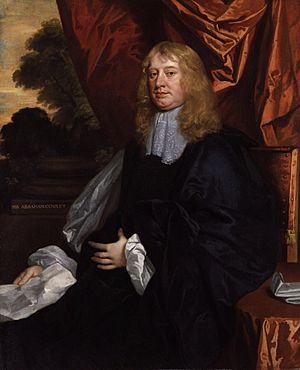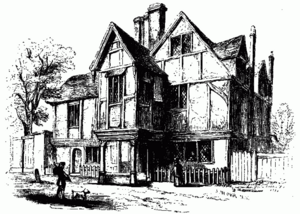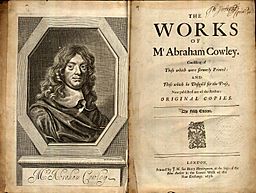Abraham Cowley facts for kids
Abraham Cowley (born in 1618 – died July 28, 1667) was an important English poet and essayist. He was born in the City of London. Cowley was one of the most famous English poets of the 1600s. His book Works was printed 14 times between 1668 and 1721.
Contents
Early Life and Amazing Talent
Abraham Cowley's father was a wealthy Londoner who sold books and paper. He died before Abraham was born. His mother loved religious books. In her living room, there was a copy of The Faerie Queene, a long poem. Young Abraham loved this book and read it twice before he even went to school!
First Poems and School Days
When he was only ten years old, in 1628, Cowley wrote a long poem called Tragicall Historie of Piramus and Thisbe. It was an amazing achievement for such a young boy. The poem was well-written and showed great imagination.
Two years later, he wrote another big poem, Constantia and Philetus. Around this time, he started attending Westminster School. At Westminster, he showed incredible talent and wrote an elegy (a sad poem) when he was just thirteen.
In 1633, these early poems were put together in a book called Poeticall Blossomes. It was dedicated to his headmaster and included praise from his school friends.
Becoming Famous as a Teenager
Cowley became famous right away, even though he was only fifteen years old. His next work was a play called Loves Riddle. It was a wonderful play for a sixteen-year-old, with light, correct, and musical language. The play moved quickly and smoothly.
In 1637, Cowley went to Trinity College, Cambridge. He loved learning all kinds of subjects and quickly became known as a very smart student. He wrote a long poem about the life of King David in Latin. An English version of this poem, called the Davideis, was published after he died.
Plays and the Civil War
In 1638, his play Loves Riddle and a Latin comedy were printed. In 1641, Prince Charles (who later became King Charles II) visited Cambridge. Cowley wrote another play, The Guardian, which was performed for the prince and was very successful. This play was bright and funny.
Life During the English Civil War
The peaceful life of the young poet changed in 1642 because of the English Civil War. Cowley strongly supported the King's side (the Royalists). He was a fellow at Trinity College, Cambridge, but the Parliamentarians removed him in 1643. He then went to Oxford, where he became friends with Lord Falkland and gained the trust of the royal family.
Working for the King in Exile
After a big battle called Battle of Marston Moor, Cowley followed the Queen to Paris, France. He lived in exile for twelve years. During this time, he worked for the royal family. He traveled to places like Jersey, Scotland, and the Netherlands to help the King.
His most important job was sending secret messages between the King and Queen. He wrote and decoded most of their letters himself. He also managed a large network of spies. This work took up all his days and many nights for several years.
Writing Poems in Exile
Even with all his work, Cowley kept writing. In Paris, he learned about the poems of Pindar, a Greek poet. Cowley wanted to write similar powerful poems in English. He created a new style of ode (a type of poem) that used lines of different lengths and rhyme patterns. These poems are still called Pindarics or Cowleyan Odes. Famous poets like Coleridge and Wordsworth later used this style.
In 1647, a collection of his love poems, The Mistress, was published. His fame grew steadily. In 1656, he returned to England and published a book of his collected poems. He was considered the best poet of his time. This book included his Pindarique Odes, Davideis, Mistress, and other poems.
Among his other poems were some of his best works. These included sad poems (elegies) for friends and famous people like Vandyck and Crashaw. He also wrote a funny poem called The Chronicle about his made-up love stories.
Later Life and Retirement
Soon after returning to England, Cowley was mistakenly arrested. He was released after paying a large bail. In 1658, he changed his play The Guardian and renamed it The Cutter of Coleman Street. It was performed in 1661.
When Oliver Cromwell died in late 1658, Cowley went back to Paris. He stayed there until King Charles II returned to England (the Restoration). Cowley came back with the King.
Cowley was allowed to retire to the countryside. Through his friend, Lord St Albans, he got a property near Chertsey. There, he spent his time studying plants and reading books. He lived a quiet life until he died.
He was also very interested in science. He was one of the people who suggested creating an academy (a group) to support scientific work. Cowley's ideas helped lead to the creation of the Royal Society, a famous scientific group.
Death and Legacy
Cowley died at his house in Chertsey. He caught a cold while working with his farm laborers one evening. On August 3, he was buried in Westminster Abbey, next to famous poets like Chaucer and Spenser. In 1675, a monument was built there to honor him.
The first collection of Cowley's works was published in 1668. It included his Latin poems, like Six Books of Plants. More volumes were added later. These collections were reprinted many times and were the main editions of his work for a long time.
See also
 In Spanish: Abraham Cowley para niños
In Spanish: Abraham Cowley para niños
 | Lonnie Johnson |
 | Granville Woods |
 | Lewis Howard Latimer |
 | James West |




